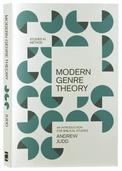 Modern Genre Theory: An Introduction for Biblical Studies
Modern Genre Theory: An Introduction for Biblical Studies
Andrew Judd
Zondervan Academic 2024
Reviewed By David Mitchell
Judges 19 is one of the most confronting stories in the Old Testament. How are we supposed to read it? Is it something of a cautionary tale about the likely outcome for those who commit adultery? Perhaps, like a modern horror film, its designed specifically to make us squirm and shrink away from it. Or, perhaps, it’s better understood as being a piece of wisdom literature with complex truths about life under the sun being conveyed through the narrative. Or, would we be better understanding it as simply another dot point in the decline of the Jewish nation during the period of the judges as they await a king? Or is it some mix of all of things?
How we read a given passage of scripture depends significantly on what genre we assign it. Hence the battle, say, between the literal six-day creationist and the theistic evolutionist, or between the reader who takes Jesus’ parable of the rich man and Lazarus (Luke 16:19–31) as speaking about the actual intermediate state and the person who thinks it does not. On all sides of such debates, people can agree on the authority of the Scriptures and yet be at odds as to what the scripture in question is authoritatively teaching.
If we read a section of text as satirical or sarcastic, we would take the meaning as completely opposite to what it might look it says! Such is the power of genre. With all these questions about genre, it is a surprisingly neglected aspect of Biblical studies and hermeneutics (and I say this as a lecturer in these fields)! I suspect that this is largely because genre is so fundamental and foundational we miss that it is there, like how I once looked for my glasses for 10 whole minutes before I realised that I was in fact already wearing my glasses (it had been a long day!).
All of this is a long way in to telling you that Andrew Judd’s new book Modern Genre Theory: is well worth the time it will take you to read. Following on from the work he put into his doctoral studies, Judd reviews some of the history of the way genre has been viewed in the academic world (both in theological and non-theological circles), carefully lays out 12 tenets of modern genre theory and then puts them into use to read through a full pallet of Biblical literature. He shows his working well enough for the scholarly minded to have some paths to follow up, he’s nuanced and careful in his critique (perhaps he could afford to be more strident given the effort he’s clearly put in to the research!) but while I’m sure not everyone will agree, I think his book is eminently readable and is definitely, at times, out-right funny. No small feat for a book that I’d happily set as a first-year theological text.
For seasoned exegetes it will probably mostly help you discern the glasses you’re already wearing—though there will no doubt be some fresh food for thought along away! For those starting out or looking for a way to understand the Bible better, this book offers what the sub-title describes: it gives an introduction for biblical studies through modern genre theory.
I particularly appreciated Judd’s extended treatment of Judges 19 which arises twice within the book. If you were challenged by the questions above, then this book will help you, if not find the right answers, then at least ask the right questions. In the end that’s why I think this book is excellent: There are points where I might disagree with some of Judd’s specific landing points in his case studies, but I’m convinced he’s help readers of the Bible to ask really good questions.
David works with AFES at Curtin University, teaches Introduction to Biblical Theology at Trinity Theological College, Leederville and does deputations for Bush Church Aid in Perth.
